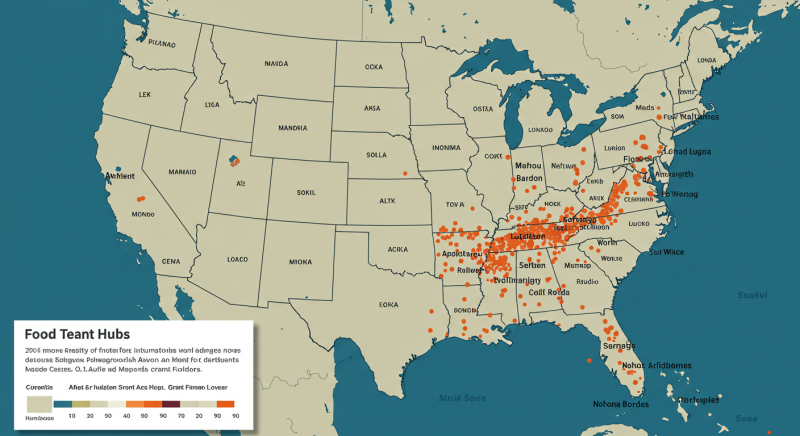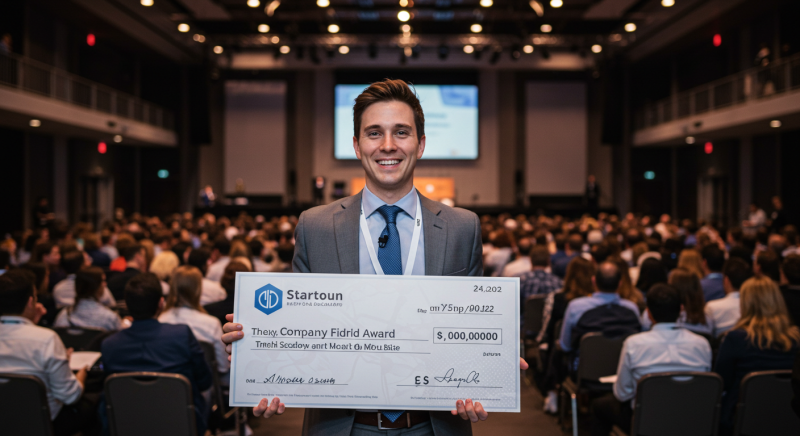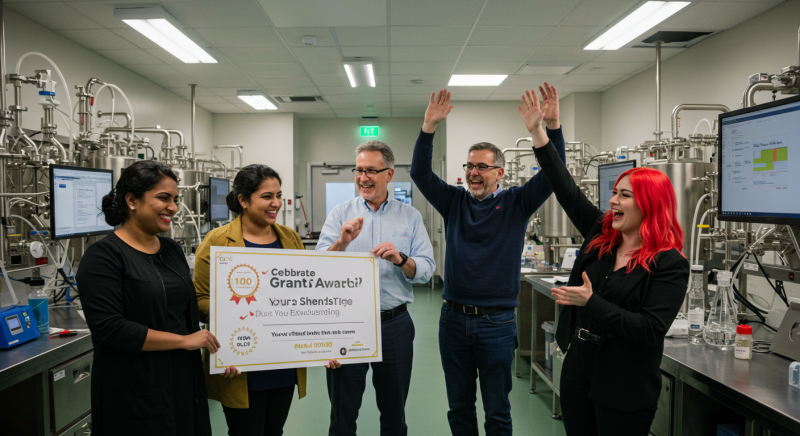Revolutionary Food Tech Grants for USA Startups
Food Tech Grants for USA Startups have emerged as a transformative lifeline for visionary entrepreneurs striving to revolutionize our food system. From government-backed SBIR programs to nonprofit initiatives fueling alternative protein research, this guide unveils proven strategies and real-world data to help your startup secure non-dilutive funding. You’ll discover which grants align with your mission, step-by-step application tips, and insider insights drawn from leading agencies like USDA NIFA, NSF, and the Good Food Institute.
Key Takeaways
In the emotional whirlwind of startup life, securing non-dilutive capital can feel like chasing a mirage. Yet Food Tech Grants for USA Startups can turn that hope into tangible resources. This guide distills essential grant programs, eligibility criteria, and application best practices into an easily digestible roadmap. You’ll learn how to align your R&D with issuer priorities, craft compelling narratives, and avoid common pitfalls that derail funding efforts.

The Journey to Funding Freedom
When Claire launched her plant-based meat startup, she poured every last cent into prototypes and lab tests. Sleepless nights blurred into days as she agonized over investor pitches. Then, a $150,000 SBIR Phase I award arrived—and with it, the validation that non-dilutive Food Tech Grants for USA Startups aren’t just a dream but a strategic pathway to scale. Claire’s tears of relief became the spark for her team’s next breakthrough.
What Are Food Tech Grants for USA Startups?
Food Tech Grants for USA Startups are non-equity awards designed to expedite research and development in food innovation, covering areas like alternative proteins, sustainable packaging, and precision agriculture. For example, America’s Seed Fund at NSF offers up to $2 million per award with no equity stake NSF – National Science Foundation. Meanwhile, USDA’s National Institute of Food and Agriculture (NIFA) provides competitive Requests for Applications (RFAs) targeting nutrition, food safety, and rural development Nation Institute of Food and Agriculture. These grants reward technical merit and alignment with national food security goals.
Top Government Food Tech Grants for USA Startups
Securing government grants is a strategic avenue for startups aiming to innovate within the food technology sector. These grants provide non-dilutive funding, enabling companies to advance research, develop prototypes, and scale operations without relinquishing equity. Below are some of the most impactful government-funded programs supporting food tech startups in the USA.
1. USDA Small Business Innovation Research (SBIR) and Small Business Technology Transfer (STTR) Programs
The USDA’s SBIR and STTR programs, administered by the National Institute of Food and Agriculture (NIFA), offer competitive grants to small businesses conducting research with potential for commercialization in agriculture and related fields. These programs are designed to stimulate technological innovation and increase private sector commercialization of innovations derived from USDA-supported research. Grants are awarded in various topic areas, including food science and nutrition, plant production, and bio-based products. Phase I grants provide up to $175,000 for 8 to 12 months, while Phase II grants can offer up to $800,000 for two years. Nation Institute of Food and Agricultureturbosbir.com
2. USDA Sustainable Agriculture Research and Education (SARE) Program
The SARE program supports research and education projects that advance sustainable innovations in American agriculture. Administered through NIFA, SARE operates through four regional councils that set policy and make grants. Since its inception in 1988, SARE has invested around $200 million in more than 5,000 initiatives, funding projects that explore practices to improve profitability, stewardship, and quality of life for farmers and communities. Wikipedia
3. USDA-FFAR Innovation Challenge
The USDA, in collaboration with the Foundation for Food & Agriculture Research (FFAR), offers the Innovation Challenge to support early-career scientists conducting research in food and agriculture. This program welcomes applications from higher education institutions, nonprofit and for-profit organizations, and government-affiliated research agencies. Eligible applicants must have received their Ph.D. within the last 10 years. The challenge aims to foster innovative solutions to pressing food system challenges. foundationfar.org
4. Good Food Institute (GFI) Research Grants
While not a government entity, GFI collaborates closely with federal agencies to fund open-access research in alternative proteins, including plant-based and cultivated meats. Since 2019, GFI has awarded over $21 million in research support across 118 grants in 21 countries. Their grant program focuses on addressing technical bottlenecks, catalyzing further funding, and fostering collaborations to attract new talent to the field. GFI’s efforts align with government initiatives to promote sustainable and equitable food systems. The Good Food Institute
By leveraging these government and affiliated programs, food tech startups in the USA can access vital resources to drive innovation, enhance sustainability, and contribute to the transformation of the food industry.

Private and Nonprofit Food Tech Grants for USA Startups
In addition to federal programs, private and nonprofit funders play a pivotal role in fueling Food Tech Grants for USA Startups by offering non-dilutive awards, mentorship, and ecosystem support bigideaventures.com New Venture Advisors LLC. Big Idea Ventures compiles an extensive A–Z list of over 50 incubators, accelerators, and grants tailored to foodtech innovators seeking impact capital bigideaventures.com. Similarly, New Venture Advisors’ Good Food Funding Guide catalogs private grants alongside loans and equity options, empowering early-stage companies with diverse financing pathways New Venture Advisors LLC.
Big Idea Ventures’ Global Food Innovation Fund II exemplifies private-sector commitment to Food Tech Grants for USA Startups, investing in breakthrough ventures across proteins, fats, and fermentation technologies bigideaventures.com. Startups under this fund benefit not only from capital but also from strategic corporate partnerships with industry giants like AAK and Bühler, accelerating commercialization trajectories bigideaventures.com.
New Venture Advisors structures its Good Food Funding Guide into four sections—government grants, private grants, loans, and equity—allowing founders to pinpoint opportunities that match their Food Tech Grants for USA Startups needs New Venture Advisors LLCNew Venture Advisors LLC. The guide highlights niche private grant programs such as those from regional food councils and community foundations, which often offer $10,000–$100,000 awards to bolster local food system innovations New Venture Advisors LLC. Moreover, New Venture Advisors regularly publishes detailed guides on specific funds like the Healthy Food Financing Initiative (HFFI) FARE Fund, which channels $60 million in grants and technical assistance to underserved communities New Venture Advisors LLC.
The Good Food Institute, a leading nonprofit research organization, runs a competitive grant program specifically for alternative protein R&D, distributing more than $7 million across 38 projects to accelerate plant-based and cell-based innovations Wikipedia. By funding open-access studies on texture, flavor, and fermentation techniques, GFI’s grants enable startups to refine their Food Tech Grants for USA Startups proposals with robust scientific backing Wikipedia.
For ventures with a social-impact angle, regional platforms like the Care Farming Network’s WGN Funding Resources compile private and nonprofit grants suited to community-oriented food initiatives Care Farming Network. These targeted funds illustrate the breadth of non-governmental assistance available to support both R&D and on-the-ground programming in sustainable food systems Care Farming Network.
Step-by-Step Guide to Applying for Food Tech Grants for USA Startups
1. Research and Identify Grant Opportunities
Before diving into paperwork, dedicate time to surveying available Food Tech Grants for USA Startups. Visit the USDA NIFA “Apply for a Grant” page to explore active Requests for Applications and program priorities Nation Institute of Food and Agriculture. Simultaneously, review the NSF SBIR/STTR solicitation topics to pinpoint challenges aligned with your technology focus SBIR.gov. Don’t overlook nonprofit partners like the Good Food Institute, whose Research Grant Program targets alternative protein projects and publishes FAQs on eligibility and award scopes The Good Food Institute.
2. Confirm Eligibility and Complete Mandatory Registrations
Most federal grants mandate registration in SAM.gov and Grants.gov before submission Nation Institute of Food and Agriculture. For Food Tech Grants for USA Startups, ensure your business is a U.S. entity with fewer than 500 employees to qualify for SBIR/STTR programs SBIR.gov. Review size and ownership requirements in the SBIR/STTR Eligibility Guide to avoid disqualification SBIR.gov. Register early—SAM.gov processing can take weeks—and maintain annual renewals to keep your account active Seed Fund.
3. Develop and Submit a Project Pitch (NSF SBIR-Specific)
If targeting the NSF’s America’s Seed Fund, begin with a concise Project Pitch. This initial 1-page summary clarifies your innovation’s technical merit and commercial potential Seed Fund. Pitches are reviewed monthly, and a positive response invites a full proposal Seed Fund. Frame your pitch around how your Food Tech Grants for USA Startups effort addresses pressing food system challenges, from sustainable packaging to cell-based meat.
4. Craft a Persuasive Technical Narrative
Whether you’re applying to USDA NIFA or NSF SBIR/STTR, the heart of your application is a detailed technical narrative. Describe your objectives, hypotheses, experimental design, and commercialization milestones in logical sequence Nation Institute of Food and Agriculture. Highlight preliminary data or prototypes to demonstrate feasibility, and align your goals with the grantor’s mission—such as USDA’s emphasis on rural development and food security Nation Institute of Food and Agriculture.
5. Assemble a Comprehensive Budget and Justification
A credible budget distinguishes successful Food Tech Grants for USA Startups proposals. Itemize personnel salaries, equipment purchases, material costs, and indirect rates. Justify each line item by linking expenses directly to project tasks—for example, specialized bioreactor rental for cell-culture optimization Nation Institute of Food and Agriculture. Avoid padding or underestimating costs, as reviewers scrutinize budgets for realism and alignment with objectives.
6. Secure Partnerships and Letters of Support
Strong collaborations bolster credibility. Engage academic labs, contract research organizations, or regional food councils whose expertise complements your project SBIR.gov. Obtain formal Letters of Support that detail the partner’s role, resource commitment, and relevance to your proposal. In USDA applications, endorsements from local extension offices can underscore community impact.
7. Review Submission Requirements and Format
Each grant program stipulates precise formatting rules—page limits, font size, margin widths, and required forms. USDA NIFA’s Grants Application Guide outlines a four-stage process, emphasizing adherence to RFA instructions in Part IV Nation Institute of Food and Agriculture. For NSF, consult the SBIR/STTR Solicitation document and the “How to Submit a Full Proposal” guide to ensure compliance Seed Fund. Noncompliant applications risk immediate rejection.
8. Submit Early and Monitor Your Application
Aim to finalize and submit your application several days before the deadline to mitigate technical issues on Grants.gov or NSF’s FastLane portal Seed Fund. After submission, verify status updates and National Institute of Food and Agriculture or NSF acknowledgments. If permitted, engage program officers with concise questions to clarify any uncertainties—professional communication can demonstrate commitment and diligence.
9. Post-Submission Follow-Up and Compliance
Winning Food Tech Grants for USA Startups is just the beginning. Upon award, review your Notice of Award for reporting schedules, allowable costs, and deliverable milestones Nation Institute of Food and Agriculture. Establish internal tracking systems for expenditures and progress reports. Maintain transparent records to ensure seamless audits and set the stage for Phase II funding or renewal applications.
By meticulously following these expanded steps, your application for Food Tech Grants for USA Startups will be comprehensive, compliant, and compelling—maximizing your chances of securing vital non-dilutive funding to propel your innovation forward.
Securing Food Tech Grants for USA Startups demands strategic alignment, rigorous proposals, and timely execution. By tapping into federal SBIR/STTR programs, USDA NIFA RFAs, and nonprofit initiatives like GFI, you can unlock non-dilutive capital to advance your food innovation. Remember that each funding source prioritizes specific goals—from rural development to alternative protein scalability—so tailor your approach accordingly. With this guide, you’re equipped to navigate the application process, avoid common pitfalls, and transform your vision into impactful solutions that feed the future.

FAQ
What is the average award size for Food Tech Grants for USA Startups?
SBIR Phase I typically awards around $200,000, Phase II can reach $1–2 million, while USDA NIFA grants range from $50,000 micro-awards to over $1 million for infrastructure projects SharpsheetsNation Institute of Food and Agriculture.
How competitive are Food Tech Grants for USA Startups?
Success rates vary by program: NSF SBIR Phase I hovers around 13–15%, while USDA NIFA grants can range from 10–25% depending on the RFA NSF – National Science FoundationNation Institute of Food and Agriculture.
Can foreign-founded startups apply for U.S. federal food tech grants?
Most federal grants require U.S.-based businesses with American ownership and operations. Review eligibility carefully on the funding agency’s portal.
Are letters of support mandatory?
While not always mandatory, letters from academic or industry partners significantly strengthen applications by demonstrating collaboration and resource access Agricultural Marketing Service.
When are SBIR and USDA grant deadlines?
SBIR deadlines vary by agency (e.g., NSF typically in June and December), and USDA NIFA publishes annual RFA schedules—check each portal for specific dates.
read more
